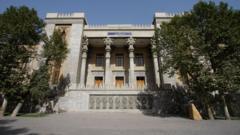Ayatollah Ali Khamenei has expressed skepticism regarding the ongoing nuclear negotiations with the United States, highlighting the excessive demands imposed by the US on uranium enrichment and the historical context of failed talks.
Khamenei Signals Doubts on US-Iran Nuclear Talks, Citing Excessive Demands

Khamenei Signals Doubts on US-Iran Nuclear Talks, Citing Excessive Demands
Iran's Supreme Leader questions the potential for a new nuclear agreement with the US, criticizing its demands for uranium enrichment cessation.
Iran's Supreme Leader, Ayatollah Ali Khamenei, has voiced significant doubts about the outcome of the ongoing nuclear discussions with the US, labeling the demands placed on Iran regarding uranium enrichment as "excessive and outrageous." "We don't think it will lead to any outcome. We don't know what will happen," Khamenei remarked, cast shadows over the hope fueled by US President Donald Trump's comments suggesting progress in the negotiations.
Despite four rounds of talks mediated by Oman since mid-April, Iran's chief negotiator outright rejected Trump’s claim that Iran had agreed to cease its enrichment activities—an essential point in any potential agreement. Trump, known for pulling the US out of the 2015 nuclear accord, cautioned Iran of possible military actions from the US and Israel should the negotiations fail.
Iran maintains that its nuclear program is entirely peaceful and emphatically denies any intention to pursue nuclear weapons. Nevertheless, it has defied existing agreement restrictions in retaliation for the reinstated US sanctions and has amassed a stockpile of highly-enriched uranium, which experts warn could potentially be developed into nuclear weapons.
During a recent ceremony commemorating the late President Ebrahim Raisi, Khamenei praised Raisi for his steadfast refusal to engage in direct negotiations with the US, highlighting that such a stance would prevent Iran from being coerced by external threats. Khamenei criticized the prior negotiations under Raisi's predecessor, Hassan Rouhani, indicating that they yielded no significant results and casting doubt on the current government’s capacity to change this trend.
The Supreme Leader articulated frustration over the US stance, emphasizing that "no one waits for their permission" concerning Iran's enrichment activities. Meanwhile, US special envoy Steve Witkoff articulated a firm stance against any allowance for Iranian enrichment capabilities, asserting that such a condition is integral to national security.
In a swift rebuttal, Iranian Foreign Minister Abbas Araqchi cautioned against unrealistic expectations such as halting enrichment, insisting such restrictions are unfeasible. The discussions, rooted in the 2015 nuclear agreement that offered Iran sanctions relief in exchange for limiting its nuclear activities, are at a critical juncture as both sides navigate their demands and terms. The International Atomic Energy Agency has recently flagged Iran's stockpile of enriched uranium, approximating it could be enough for the development of nuclear weaponry if further refined.




















